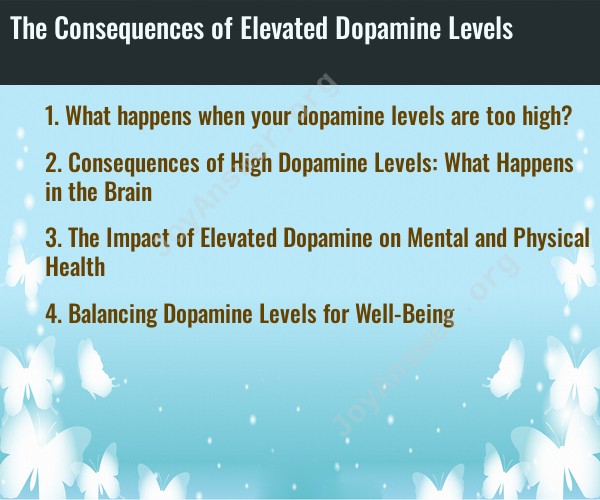What happens when your dopamine levels are too high?
Elevated dopamine levels in the brain can have various effects, and the consequences may vary depending on the extent of the elevation and the specific brain regions involved. Dopamine is a neurotransmitter that plays a crucial role in the brain's reward and pleasure systems, as well as in regulating mood, motivation, and movement. When dopamine levels are too high, it can lead to both beneficial and detrimental effects:
Positive Effects of Elevated Dopamine:
Increased Alertness and Motivation: Elevated dopamine levels can boost alertness, attention, and motivation. This can be helpful in certain situations, such as when tackling challenging tasks or staying focused.
Enhanced Mood: Dopamine is associated with feelings of pleasure and happiness. Elevated dopamine levels can lead to an improved mood and a sense of well-being.
Improved Creativity: Some individuals may experience heightened creativity and problem-solving abilities when dopamine levels are elevated. This can be beneficial in creative pursuits.
Negative Effects of Elevated Dopamine:
Risk of Addiction: One of the most significant concerns with elevated dopamine levels is an increased risk of addiction. Drugs, including stimulants like cocaine and amphetamines, can lead to a rapid and excessive release of dopamine, reinforcing the desire to use them repeatedly.
Impulsivity: Elevated dopamine levels can lead to impulsivity and poor decision-making. This can result in risky behaviors, including reckless driving, substance abuse, and unsafe sexual practices.
Psychiatric Disorders: Abnormal dopamine levels have been associated with certain psychiatric disorders. High dopamine activity is often observed in conditions like schizophrenia and bipolar disorder, and it can contribute to symptoms such as hallucinations, delusions, and mood swings.
Stress and Anxiety: Excessively high dopamine levels can contribute to feelings of restlessness, anxiety, and stress. It may lead to a sense of being constantly on edge.
Insomnia: Elevated dopamine levels can interfere with sleep patterns, making it difficult to fall asleep or stay asleep. This can lead to insomnia and sleep disturbances.
Motor Disorders: Elevated dopamine activity in certain areas of the brain can lead to motor disorders like tics, chorea, and dystonia.
Cognitive Impairment: Very high levels of dopamine can impair cognitive function, including memory and executive function. This can result in difficulties with concentration and decision-making.
It's important to note that the consequences of elevated dopamine levels can vary among individuals, and the specific effects may depend on genetic predispositions, environmental factors, and the presence of underlying medical conditions. Additionally, the brain has complex mechanisms to regulate dopamine levels to maintain equilibrium, and the consequences of persistently elevated levels can differ from transient increases.
If you suspect you have issues related to dopamine levels, whether too high or too low, it's essential to consult a healthcare professional for a proper diagnosis and appropriate treatment or interventions. Self-diagnosis and self-medication are not advisable in these cases.
Consequences of High Dopamine Levels: What Happens in the Brain
Dopamine is a neurotransmitter that plays a role in many important functions, including movement, motivation, reward, and learning. Dopamine is produced in the substantia nigra and ventral tegmental area of the brain and is released into the striatum and prefrontal cortex.
When dopamine levels are high, it can lead to a number of consequences, including:
- Increased motivation and reward-seeking behavior: Dopamine is often referred to as the "reward molecule" because it plays a role in motivating us to pursue things that are pleasurable or rewarding. When dopamine levels are high, we may become more motivated to seek out rewards, even if they are risky or harmful.
- Impaired impulse control: Dopamine also plays a role in impulse control. When dopamine levels are high, we may have difficulty controlling our impulses, which can lead to risky or impulsive behavior.
- Increased anxiety and paranoia: High dopamine levels can also lead to anxiety and paranoia. This is because dopamine is involved in the processing of stress and fear.
- Psychosis: In extreme cases, high dopamine levels can lead to psychosis, which is a condition characterized by delusions, hallucinations, and disorganized thinking.
The Impact of Elevated Dopamine on Mental and Physical Health
Elevated dopamine levels can have a significant impact on mental and physical health. Some of the potential consequences of elevated dopamine include:
- Addiction: Dopamine plays a central role in addiction. When we use drugs or engage in certain activities, such as gambling, the brain releases dopamine. This release of dopamine reinforces the behavior and makes us more likely to repeat it.
- Mental health disorders: Elevated dopamine levels have been linked to a number of mental health disorders, including schizophrenia, bipolar disorder, and attention deficit hyperactivity disorder (ADHD).
- Physical health problems: Elevated dopamine levels can also lead to a number of physical health problems, such as high blood pressure, heart disease, and stroke.
Balancing Dopamine Levels for Well-Being
There are a number of things that people can do to balance dopamine levels and promote well-being. Some of these things include:
- Getting regular exercise: Exercise releases dopamine and other endorphins that have mood-boosting effects.
- Eating a healthy diet: A healthy diet can help to regulate dopamine levels and improve overall mood.
- Getting enough sleep: Sleep is essential for brain health and can help to regulate dopamine levels.
- Practicing mindfulness: Mindfulness meditation has been shown to reduce stress and anxiety and improve dopamine regulation.
- Avoiding drugs and alcohol: Drugs and alcohol can disrupt dopamine levels and lead to addiction and other health problems.
If you are concerned about your dopamine levels or are experiencing any of the symptoms associated with elevated dopamine, it is important to talk to a doctor or mental health professional. They can help you to develop a plan to manage your dopamine levels and improve your overall health and well-being.













